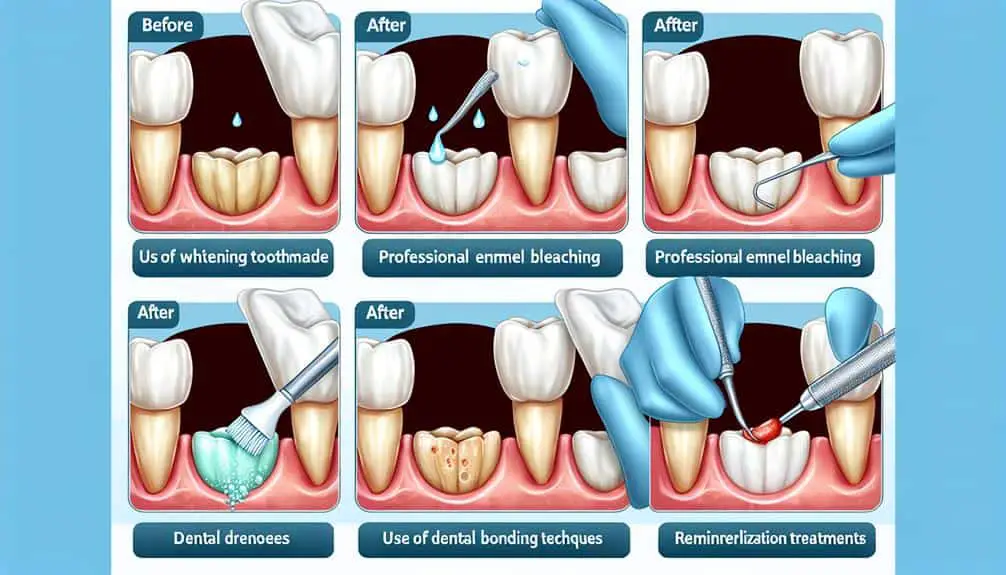To safeguard your enamel while brightening your teeth safely, choose enamel-friendly whitening products that contain natural ingredients like baking soda and steer clear of harsh chemicals such as chlorine dioxide. Prioritize enamel protection by using toothpaste that helps remineralize, incorporating fluoride mouthwash, and maintaining good oral hygiene practices. Professional whitening options, such as in-office treatments with professional-grade whitening gel, offer personalized care for enamel protection.
By understanding the effects of whitening agents on enamel and following these tips, you can guarantee a healthy smile. Explore further to discover enamel-friendly DIY remedies and additional professional whitening techniques for thorough enamel care.
Key Points
- Choose whitening products with natural ingredients like baking soda for enamel safety.
- Opt for enamel sensitivity formulas to ensure gentle whitening results.
- Avoid harsh chemicals such as chlorine dioxide in whitening products to protect enamel.
- Consult a dental professional for personalized recommendations on enamel-safe whitening.
- Prioritize products that safeguard enamel and prevent sensitivity for effective whitening.
Understanding Enamel and Whitening Effects
To understand the effects of teeth whitening on enamel, it's important to recognize the structure of enamel and how whitening agents interact with it. Enamel, the outer layer of the teeth, is a highly mineralized tissue that serves as a protective barrier. It consists mainly of hydroxyapatite crystals, which are tightly packed together, providing strength and resilience to the tooth surface. When whitening agents come into contact with the enamel, they penetrate the surface to break down stains and discoloration, revealing a brighter appearance.
The benefits of teeth whitening on enamel include the removal of extrinsic stains caused by coffee, tea, or smoking. Whitening can enhance the overall aesthetic of your smile, boosting confidence and self-esteem. However, it's essential to use enamel-safe whitening products to prevent damage and sensitivity. Understanding how whitening agents interact with enamel can help you make informed decisions when choosing the right products for your oral care routine.
Choosing Enamel-Safe Whitening Products
When selecting teeth whitening products, prioritize those that are gentle on enamel to safeguard your oral health and maintain a bright smile. It's crucial to choose enamel-safe whitening options to prevent sensitivity and damage.
Here are four key factors to keep in mind when selecting whitening products:
- Check for Natural Alternatives: Opt for whitening products that contain natural ingredients like baking soda or activated charcoal. These alternatives are gentle on enamel and effective in removing stains without causing harm.
- Look for Enamel Sensitivity Formulas: Consider products specifically designed for individuals with enamel sensitivity. These formulas are formulated to protect your enamel while still providing effective whitening results.
- Avoid Harsh Chemicals: Stay away from whitening products that contain harsh chemicals like chlorine dioxide, as these can erode enamel over time. Opt for gentler options to protect your teeth.
- Consult with a Professional: If you're unsure about which whitening products are best for your enamel, consult with a dental professional. They can recommend safe and effective whitening options tailored to your specific needs.
Tips for Enamel Protection During Whitening
Consider integrating a remineralizing toothpaste into your oral care routine to fortify enamel during the whitening process. These toothpastes contain ingredients like fluoride, calcium, and phosphate that can help prevent enamel erosion and promote remineralization. In addition, using a fluoride mouthwash can provide extra protection by remineralizing and strengthening the enamel.
To further safeguard your enamel during whitening, it's crucial to follow some preventative measures. Avoid acidic foods and beverages that can weaken enamel, such as citrus fruits, sodas, and certain types of candy. When whitening your teeth, make sure to follow the instructions carefully and not exceed the recommended usage to prevent enamel damage.
Enamel strengthening can also be supported by maintaining good oral hygiene practices like regular brushing and flossing. Consider using a soft-bristled toothbrush to prevent enamel abrasion while ensuring effective plaque removal. Lastly, scheduling regular dental check-ups can help monitor the health of your enamel and address any concerns promptly. By taking these steps, you can protect your enamel while achieving a brighter smile.
Enamel-Friendly DIY Whitening Remedies
Enhance your smile with these enamel-friendly DIY whitening remedies. When looking to whiten your teeth at home while also preserving enamel, consider these natural techniques and preventative measures:
- Oil Pulling: Swishing coconut oil or sesame oil in your mouth for about 15-20 minutes can help remove plaque and bacteria, promoting a brighter smile without harming enamel.
- Baking Soda Paste: Mixing a small amount of baking soda with water to create a paste can gently scrub away surface stains. Limit use to once a week to prevent enamel erosion.
- Strawberry and Baking Soda Mask: Mashing strawberries with baking soda and applying the mixture to your teeth for a few minutes can help whiten teeth naturally due to the fruit's malic acid content.
- Activated Charcoal: While controversial, using activated charcoal sparingly and correctly can attract and remove stains from the teeth. Be cautious to prevent enamel abrasion by using it infrequently.
These DIY remedies offer a gentle approach to teeth whitening, safeguarding your enamel while aiming for a brighter smile.
Professional Whitening Options for Enamel Care
For those seeking professional whitening options that prioritize enamel care, consulting with a dentist is crucial to guarantee safe and effective treatment. Dentists can offer enamel safe whitening techniques that are tailored to your individual needs. One common approach is in-office whitening, where a professional-grade whitening gel is applied to your teeth, often in conjunction with a special light to enhance the whitening process. This method ensures that the whitening agent is applied carefully to minimize potential enamel damage.
Moreover, dentists may recommend enamel strengthening treatments before or after whitening procedures to maintain the health of your teeth. These treatments can include fluoride applications or remineralization therapies to help fortify your enamel and protect it from sensitivity or erosion during the whitening process.
Frequently Asked Questions
Can Teeth Whitening Permanently Damage Enamel?
Teeth whitening can potentially damage enamel if not done correctly. To prevent such harm, make sure you use safe methods that prioritize enamel protection. Consult with dental professionals for guidance on maintaining a healthy smile without compromising enamel integrity.
How Long Do the Effects of Enamel-Safe Whitening Products Last?
For those craving that dazzling smile, enamel-safe whitening products can offer results that last beyond the ordinary. With proper maintenance and care, the effects can endure for months, ensuring both longevity and health for your enamel.
Are There Any Long-Term Effects on Enamel From Using DIY Whitening Remedies?
When utilizing DIY whitening remedies, make sure enamel protection by selecting natural remedies that encourage enamel health. Long-term effects on enamel from improper use of DIY methods may involve sensitivity and enamel erosion. Consult your dentist for safe whitening options.
What Are the Potential Risks of Over-Whitening for Enamel Health?
Over-whitening can lead to enamel erosion, causing sensitivity and discoloration. To prevent this, adopt enamel-strengthening habits like using fluoride toothpaste, avoiding acidic foods, and regular dental check-ups. Balance is key for maintaining enamel health.
How Can Someone Tell if Their Enamel Has Been Compromised by Teeth Whitening Treatments?
Feeling unsure if your enamel took a hit from whitening? Look out for increased sensitivity to hot or cold, a rough texture, or transparent edges on your teeth. Prevent enamel erosion with gentle care.



